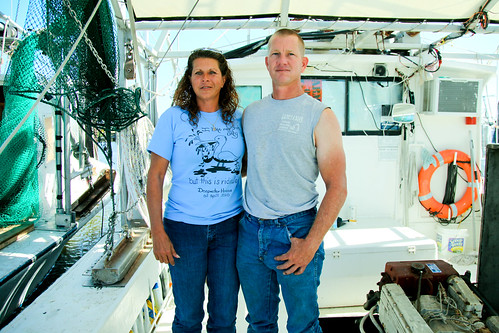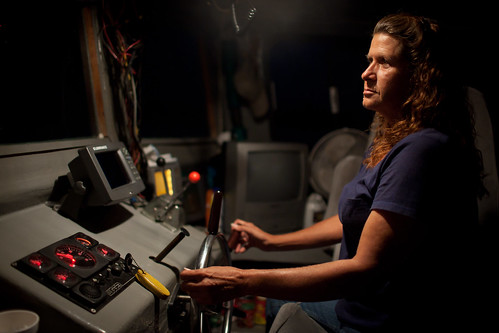In the Bayou, Husband and Wife Battle Oil Disaster and Fish for Survival
Darla Rooks is a bayou fisherman to the core. When she married Todd 20 years ago, she wore her white plastic fishing boots under her wedding dress. Todd and Darla love shrimping in the coastal waters of Louisiana the way cowboys love riding the west Texas range. It's in their blood—a calling passed down through the generations—a lifestyle they hope to pass on to their grandkids.
But the BP oil disaster may put an end to that. Now Darla and Todd are living on their boat, out of work, desperately trying to catch a few remaining shrimp before the cold winter winds blow them all out to sea. They're catching seafood the government says is safe, but they won't feed it to their grandkids, not after what they've been through this summer.
Listen to Louisiana shrimp fishermen Darla and Todd Rooks talk about the devastating impact of the BP oil disaster on their fishing community in the video slideshow below, the latest installment in a partnership between StoryCorps, NRDC and Bridge the Gulf -- "Stories from the Gulf: Living with the BP oil disaster."
It all started on a warm spring night last May in the fertile fishing grounds near Barataria Bay. BP's busted undersea well was in its early days of eruption, spewing more than two million gallons of Louisiana crude into the sea each day. Todd and Darla were trawling at night near the Gulf in Four Bayou Pass, trying to capture as many shrimp as they could before the offshore oil finally made its way to the coast. Unknown to Todd and Darla, that night would be the first time the massive oil and chemical dispersant mix began pouring into the Barataria Bay.
Darla remembers what it felt that night after she was doused with water that she believes was full of oil and dispersants. It was like being covered in stinging jellyfish, she says, except there were no jellyfish to be found.
My husband shook the nets and water went on me. I didn't have a menstrual period for four months. I had rash, itching irritated skin, something similar to bronchitis which I've never had. It lasted for three or four months. Eye irritations, heart pains, heart palpitations, involuntary muscles jumping all over my body, and continuous headaches day and night…all I would get is a about a 15 minute to a 20 minute break from pain relievers that are specifically designed to get rid of headaches, that’s the only break I would get. And I had to eat those 24 hours a day, seven days a week for three to four months… And they want to tell me to eat the seafood? Why don’t they eat the seafood. I’ll go catch them and I’ll throw BP a big old boil….I’m not eating it.

Photo by Lisa Whiteman/NRDC
Since then, Darla and Todd won't allow their grandkids to swim in the water, especially after their six-year-old got splashed with water while riding on their boat and developed a painful red burn-like mark on his face. And when the oil gushed in and coated the marshes of their prized fishing grounds, they began to notice things they've never seen before. Shrimp were swimming on the top of the water during the day in 100-degree heat. Birds were strangely absent. Even the water didn't smell the same. "It's supposed to smell like fish, shrimp, crabs and oysters and salt," Darla says. "We smell nothing; it smells like tap water."
Darla and Todd worked for a while on the BP cleanup, but when they started talking publicly about cleanup workers being exposed to oil without protective gear, they got angry. They say oil in the water and in the marshes, yet government officials were saying the water and seafood was safe. Not safe enough for them to swim in it or eat the seafood, Darla says. Darla spoke out at a town Hall meeting in Buras, and the next day, she says, their boat was taken off the cleanup and they were out of work. At some point the anger just boils over.
You see somebody one walk in with a BP T-shirt you want to just knock 'em out -- you have to leave. There's that much animosity between us and them. They're not from here; this is not their backyard, this is not their homeland, this is not what they have to live in. This is what we love – they’re taking way our heart, our soul, our income – they’re taking away everything, and that of our descendants. They have no remorse for it, none whatsoever, it's just a like a paycheck… even if they gave me $500,000 today how long is that going to last? What do I do when that’s over and they’re nothing left to do?
Life in this community of fisherman has been tough since the spill in ways people up north can't understand, people here say. It's one thing to be out of work, but it’s another to wonder if the life you've lived and loved for so long has come to an end. Darla and Todd's house was destroyed five years ago in Katrina, and now they are living in the cramped cabin of their fishing boat. After being happily married for 20 years, they now get on each other’s nerves stuck living on the small boat. “It’s making us insane,” Todd says.
Eventually Darla became seriously depressed and she says she even considered suicide. It’s a tragedy experts say occurs with more frequency after major oil disasters. Even tough-as-nails fishermen have their limits. Darla is one tough fisherman, but she admits the oil disaster has nearly pushed her over the edge.
I hung a hangman's noose on the back deck of my boat and my husband said “What are you doing with that on the boat?” And I said, “Well if I don’t have no way to live I might as well stick my head upside in it and climb up on a box and jump off.” And he said, “You got to be crazy.” I was depressed and suicidal for a long time until I met a man who was very helpful and told me, “Well, you can go kill yourself, but that's exactly what BP wants --because dead people don't talk, dead people don't complain, dead people don't sue, and dead people don't fight. You want to give BP what they want, go ahead and kill yourself.” And I decided right then and there to stand up and fight for my land. And it’s time for everybody else to stand up and fight for their land.

Photo by Anthony Clark/NRDC
Darla and Todd are not sure they'll ever have the life they once lived and loved in the bayou: the trips out in warm Gulf waters with the grandkids, feeding turtles and dolphins—relating to nature in ways that families in other parts of the country can’t understand. But they worry the oil disaster could turn that world upside down. They no longer are sure the water and seafood is safe. And they have no idea what the oil’s impact will be on future generations of shrimp and crab. It weighs on their minds constantly as they trawl for the last remaining shrimp of the season. The destruction of the marshes caused by oil and gas pipelines has left permanent, irreparable scars that could destroy this fragile ecosystem. Darla and Todd say it's all about money, and once the oil companies have gotten what they want, they will move on. Darla and Todd know they will be left with the destructive aftermath.
Right now the shrimp are moving out of the bayous and further out to sea to escape the cold, swimming out to the open ocean where tar ball are still washing in on the beach. Mostly, Darla and Todd wonder what will happen when the shrimp return to the marshes next spring to spawn. What will the oily tides do to these bottom-dwelling creatures? Will their grandkids ever be able to live the life they've loved on the sea, watching the sunrises and sunsets cast rose-colored glows across the bays of the bayous from their boats?
Darla and Todd don't have answers to these questions. All they can do is fish and pray the life-sustaining forces of the Gulf will survive the oil industry’s poisonous onslaught. It’s a battle they know nature will lose if we don't protect it from disasters tied to our insatiable thirst for oil.
Their future depends on it.
